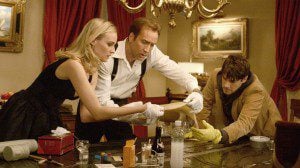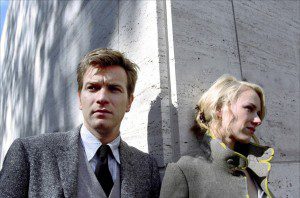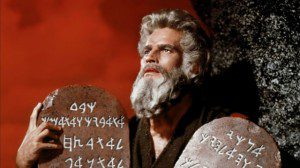 About eight years ago, something happened to Nicolas Cage. Known until then as an offbeat but fascinating charactor actor, Cage won an Oscar for playing an alcoholic who literally drinks himself to death in Leaving Las Vegas — and then he suddenly turned into an action hero. Many, but not all, of Cage’s onscreen adventures since then have been produced by Jerry Bruckheimer, including the R-rated action movies The Rock and Con Air and the PG-13 heist flick Gone in 60 Seconds. But now, with National Treasure — a PG-rated romp through the relics, myths and legends surrounding America’s founding fathers — Cage and Bruckheimer have set their sights on a younger, and perhaps less critical, audience. This film is being released as a full-fledged Walt Disney picture, and unlike some of Cage’s more intense flicks, this one has the benign villains and occasionally silly sensibility of those films Disney used to churn out back in the ’70s and show as two-parters on their Sunday-night “Wonderful World of Disney.” The main difference is, this new film has bigger stars and a bigger budget.
About eight years ago, something happened to Nicolas Cage. Known until then as an offbeat but fascinating charactor actor, Cage won an Oscar for playing an alcoholic who literally drinks himself to death in Leaving Las Vegas — and then he suddenly turned into an action hero. Many, but not all, of Cage’s onscreen adventures since then have been produced by Jerry Bruckheimer, including the R-rated action movies The Rock and Con Air and the PG-13 heist flick Gone in 60 Seconds. But now, with National Treasure — a PG-rated romp through the relics, myths and legends surrounding America’s founding fathers — Cage and Bruckheimer have set their sights on a younger, and perhaps less critical, audience. This film is being released as a full-fledged Walt Disney picture, and unlike some of Cage’s more intense flicks, this one has the benign villains and occasionally silly sensibility of those films Disney used to churn out back in the ’70s and show as two-parters on their Sunday-night “Wonderful World of Disney.” The main difference is, this new film has bigger stars and a bigger budget.
Seen in that light, National Treasure can be enjoyed as preposterous fun, even when you sense that the cast and crew are just going through the motions. Cage plays Benjamin Franklin Gates, the latest in a long line of men who have shared an incredible secret going back centuries and transmitted from one generation to the next. The first time we see Benjamin, he is a preteen boy rummaging through his grandfather’s attic — and when his grandfather (Christopher Plummer) finds him there, he sits the lad down, tells him he’s probably old enough now to hear the family story, and proceeds to tell him the tall, tall tale of a vast, unimaginable treasure that was amassed by the ancient Egyptian and Roman empires, and which the Knights Templar found in Jerusalem during the Crusades.
One might assume these soldiers would have been happy to keep the plunder for their own vain purposes, but no, these knights decided to protect the treasure; and so, between them and the Freemasons, the existence of the treasure was kept secret, while the treasure itself was smuggled to North America, and the United States’ national documents and monuments were peppered with clues to the treasure’s hiding place. That all-seeing eye hovering over the pyramid on the back of the dollar bill? That clock at Independence Hall on the back of the hundred-dollar bill? All these things contain secrets, planted there by the founding fathers. And as Benjamin grows up, he dedicates his life to following the clues — even though it means racing against dastardly rival treasure hunters and skeptical police officers and the like. It’s all rather like The Da Vinci Code, but without the sacrilege.
The first half of the film revolves mostly around the Declaration of Independence, the back of which, Benjamin discovers, has an invisible map. Ian Howe (Sean Bean), a former benefactor and current rival of Benjamin’s, plans to steal the Declaration for his own selfish gain, and since none of the authorities in Washington believe Benjamin when he tries to warn them, Benjamin decides he must steal it first in order to protect it. (The words “Declaration of Independence” are used so often in this film, you begin to suspect the screenwriters dedicated a special button on their keyboard to that phrase.)
Benjamin and his computer-whiz partner Riley Poole (Justin Bartha) carry out the heist with the help of high-tech equipment, the effect of which is enhanced by the film’s own reliance on that annoying modern stylistic tic of fast-forwarding through short bursts of film, instead of building a straightforward montage out of straightforward cuts. Their plan goes fairly smoothly, until a National Archives exec named Abigail Chase (Diane Kruger) is kidnapped by Ian and his men — and so, with the police on their tail, Benjamin and Riley have to save the girl and keep the Declaration of Independence out of Ian’s hands and track down the rest of the clues while staying “off the grid.” As a result, the rest of the film is less about fancy gizmos and more about deciphering riddles and following shadows at certain times of day and looking for tunnels behind centuries-old coffins.
There is a certain Indiana Jones quality to the proceedings, especially toward the end of the film, but without that brush of the transcendent or supernatural that made Indy’s adventures more than just jazzed-up Saturday-matinee fare. Parallels to The Da Vinci Code also fall short in this area; whereas Dan Brown’s book zips through the history of Christianity and mixes fact with fiction in order to undermine traditional understandings of the Church, this film actually leaves the surface meaning of the United States’ founding documents quite intact, even as it spins a lot of hooey for the sake of a fun ride. Benjamin says that one must sometimes do what seems wrong to others in order to do what one believes to be right, and, well, if that sounds like little more than an excuse to break the law, just what does one call the American revolution against the British, anyway?
The fun thing about conspiracy thrillers, especially when they reach back thousands of years, is that they appeal to that part of us that suspects there is more to the world than we can see; they goad us into looking at the world in new ways. But National Treasure offers nothing more shocking than an invisible treasure map, and eventually, we know that the fun of solving every puzzle only to find another puzzle behind it must come to an end. If, as Benjamin’s disillusioned father (Jon Voight) suggests, there is no truth to the legends, and the clues were created simply to keep the British distracted, then the mystery is hollow and serves no purpose; but if the legends are right, then the trail of clues will eventually come to an end, in a big pile of stuff, and no matter how appealing that stuff might be, it probably won’t produce that same thrilling sensation of moving “further up and further in.”
Still, hey, it’s a treasure hunt, and it’s fun to follow the clues, no matter how contrived some of them may be, or how incredibly coincidental certain plot turns might be (this is the kind of movie in which someone hoping to find a ship buried under the ice digs for just a few seconds and hits a metal plaque bearing the ship’s name), or how very unlikely some of the techniques supposedly developed by America’s founding fathers would seem to be.
Granted, the actors aren’t in especially top form. Nearly all of them, including Harvey Keitel as a federal agent, seem to regard this movie as basically just another paycheck, and while they’re all competent enough, they tend to underplay their roles, or to restrain themselves; the film’s humor is pretty dry, deadpan, almost aloof at times. (Plummer, at least, brings just the right touch of hamminess to his cameo.) And riddle-solving stories like this are probably more fun to read than to watch, because you can savor the mystery’s cleverness at your own pace, instead of trying to keep up with the actors.
But if you can see the film through the eyes of a relatively young boy or girlone who can separate fact from fiction, and one who thinks a cheesy thriller is the ideal way to pick up new facts about the history of his countrythen this isn’t that bad a yarn, really.
2 stars (out of 4)
–
Talk About It
Discussion starters
1. In one scene, Benjamin Gates drinks a toast to “high treason” and says the American founding fathers “did what was considered wrong in order to do what they knew was right.” Is this attitude consistent with Christian principles? How do we know what is right? How do we know when it is okay to break the law, or to commit “high treason”?
2. Why do you think the Knights and Freemasons left so many clues behind, if they wanted the treasure to remain hidden? Should the treasure still be kept hidden, if and when the characters find it? Of what value is a treasure that almost no one knows exists?
3. The young Benjamin Gates asks his grandfather if they come from a family of “knights.” Why do you think knighthood appeals to people, and especially to the young? Do you think the grown-up Benjamin Gates acts like a knight, or is influenced by knightly ideals?
4. Why do you think stories about ancient mysteries appeal to North American audiences? Doesn’t North America have enough history of its own? In what ways can we feel connected to history by being part of the Church?
The Family Corner
For parents to consider
National Treasure is rated PG for action violence and some scary images. The bad guys fire guns because that’s what bad guys do, but the film doesn’t emphasize the peril; someone lights a flare in a room filled with gunpowder, people swing from open doors in moving vans, one person falls into a dark abyss, and a man cuts his finger so that his blood can help solve a clue. A man and a woman also change clothes in separate but parallel changing rooms that have rather short doors. Parents might want to discuss with their children the idea that the American Revolution was both rebellious and committed to higher ideals.
— A version of this review was first published at Christianity Today Movies.











